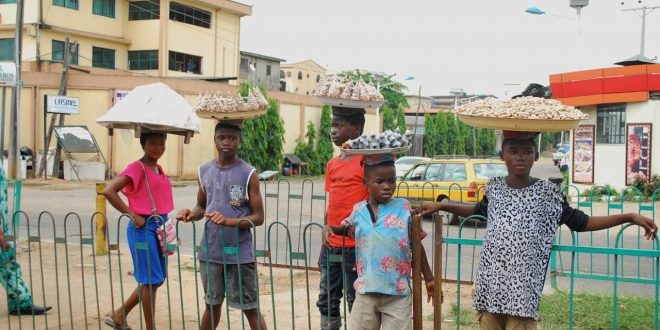On school days, children who are meant to be in school are seen hawking goods like gala, bottled drinks, and fruits from one part of Port Harcourt city to another. It is the same in other States in Nigeria. This exclusive by TPCN captures the ordeals of minors who are victims of child labour.
Many children are more often than not in the comfort of their homes when night falls. For a number of those who hawk on the streets of Port Harcourt and other big cities in Nigeria to make a living, it is not the case as they are seen desperately trying to vend their goods. To them, the street is home at all times.
In Nigeria, the number of children hawking on the streets is alarming. According to the International Labour Organization, the number of working children under the age of 14 in Nigeria is estimated at 15 million.
In addition, the National Bureau of Statistics (NBS) 2018 Multiple Indicator Cluster Survey (MICS) says about 50.8 per cent of Nigerian children, aged between 5 and 17, are involved in child labour.
According to the United Nations Educational, Scientific and Cultural Organization, UNESCO, Nigeria has 10.5 million out-of-school children, the highest rate (47%) anywhere on earth. Almost 1 out of every 3 primary school aged children is out of school, and roughly 1 out of 4 junior secondary school aged children is out of school.
Children conductors and hawkers make up a good proportion of the above analysis. They live in their own world and expand their slangs as the society evolves.
Quite a lot of factors are responsible, but the key one is poverty. Parents who give their children out as house helps do so because of the deteriorating economic conditions. The same goes for parents who send their kids to the street to hawk goods or food items
A twelve-year-old boy named Obong Sunday ravenously carries full 20 litres of kerosene on his head on the street of Port Harcourt, which he sells to make a living for his madam who brought him from the village in the pretense of sending him to school. He said that he was asked not to come home until he had finished selling the contents in the gallon.
He equally looked tired and hopeless. His world is crashing in his very before.
A girl named Oluchi Okoro is sent to peddle cashew nuts under the rain at the time her peers are studying in school or while others are resting at their various homes for the weekend. Her parents chose to pride their egocentric interests in material gains at the expense of their child’s safety than supporting her.
She confides to TPCN that she has not been to schools for a year now and nobody seems to care.
An investigation by TPCN, reveals that many of them are not children to some of the owners of the items they vend. These children are usually from far-off places that come to Port harcourt after their parents were promised that they would get a better life in Port Harcourt through excellent education, not knowing that after they get to the city, the reverse will be the case.
Seemingly, a number of them are said to be sexually harassed on a daily basis by paedophiles that hibernate under the pretense of buying off whatever they may be selling.
Others are pushed into prostitution for gains making by those who brought them from their different villages to Port Harcourt.
The appalling report is that street trading has enormous health implications for children’s physical and emotional development. Besides, it exposes them to sexual abuse, bodily exhaustion, accidents, death and undernourishment, drug and substance abuse and prostitution. A number of them had been crushed to death by vehicles while trying to cross highways.
In the course of this investigation, it was observed that while these hawkers are good in their business, they have nothing to do with education.
The government seem helpless in its ability to enforce existing laws enacted to protect these children. Only but a few non-governmental organizations care about the ugly trend of child labour. However, no nation develops by making sure its future generations are out of school.




